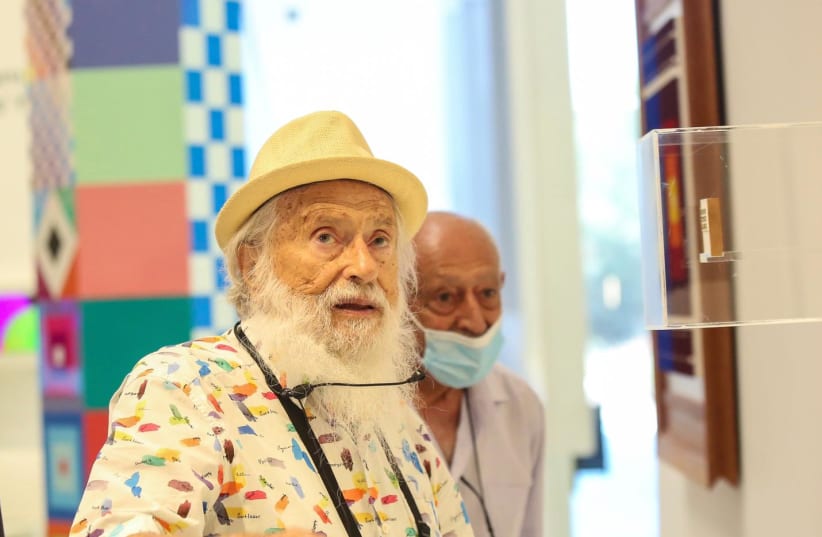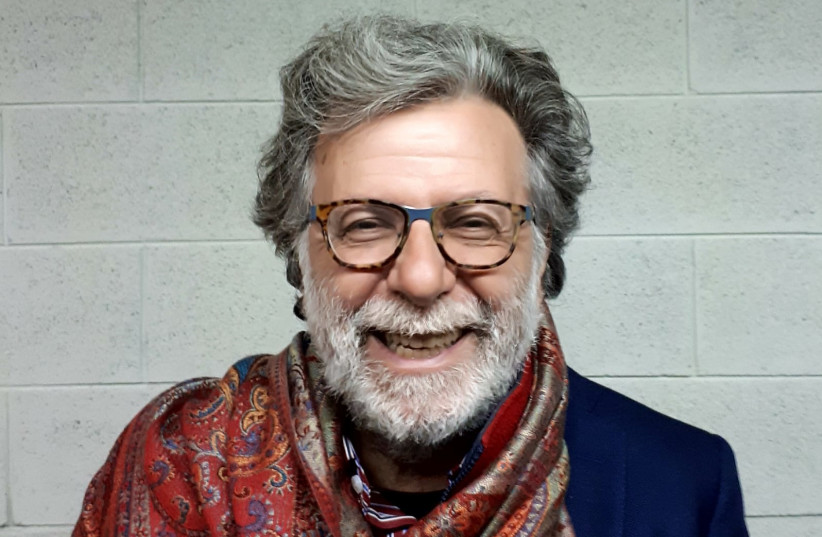The kinetic art of Yaacov Agam, one of the most successful artists this country has produced, will greet those arriving at the Rishon Lezion museum devoted to the 93-years-old artist on Thursday to mark International Men’s Day.
“Agam’s works shift with time and in relation to where one stands,” Avi Har-Tuv, 69, told The Jerusalem Post. “In that sense his art is a lot like human relationships.”
Har-Tuv became involved with International Men’s Day when author Ton van der Kroon visited Israel when a Hebrew edition of his 2018 book The Return of the King: A Renaissance of Masculinity was released. Kroon supported the goal of Israel having one hundred men circles during that day and Har-Tuv, a clinically trained social worker with decades of experience, loved the idea.
“What happens in the circle stays in the circle,” he said, “usually we all live in a mad rush. The circle is a chance to open space and time to reconnect.”
One man might share that he is divorcing his wife and spent the last four days sleeping on a friend’s couch. Another man might confess of trauma from his army days. “What is left unspoken, acts out,” Har-Tuv points out, which is why the circles can be powerful healing tools.
“In this country there are roughly 15,000 male inmates and about 120 female inmates,” Tamir Ashman, 51, shared. “Each year there are 500 suicide-related deaths, the majority of which (400) are men. Why should this be the case? We have no scientific evidence testosterone causes violence, what causes rage outbursts is adrenaline, which flows in the blood of both males and females.”
For Ashman, who teaches men who had been abusive and ended up in prison to verbalize their pain, the answer must include a deeper understanding of how we teach children to be men.
“Israeli society is conscripted, our reality is one which does not enjoy peace and is ergo in constant war,” he points out. “In many ways, when we teach children we are training them to be warriors.”
“I am not against the armed forces,” he adds, “I am against sending 18-year-old boys to impossible missions and abandoning them to deal with their trauma on their on.”
This fixation on the destiny of the nation might explain why the 1975 Holocaust and Statehood Monument by the late Yigal Tumarkin at Rabin Square or the 2003 monument honoring the Convoy of the 35 by Yossi Barel near Jerusalem, are so unlike Agam’s 1986 Fire and Water Fountain at Tel Aviv’s Dizengoff Square. Agam’s work is playful, it moves around and flames come out of it. There is music. The fountain does not ask one to salute the flag and head to the front.
As Ashman sees things, the biblical patriarch Abraham is willing to sacrifice Ishmael and Isaac; to give up his children for a grand ideal.
“This is the prototype of all the fathers who are absent from their children’s lives because they need to work the land, or fight a war or spend time in the office,” he said.
Compare that with Agam’s 1970 work The March of Time at the Tel Aviv Museum of Art. This kinetic work gives the audience a multitude of perspectives. Unlike a painting, there is no “right” way to see it, it does not freeze the viewer in one moment.
Ashman teamed up with producer Ziv Goland to offer the public a sing-along concert which explores the best-known Israeli songs about being a man. From the 1988 song Men Cry at Night by Avner Gadasi to children’s songs like Mordechai Zeira’s Pil Pilon. As Ashman sees it, the cute song about how a baby elephant has difficulties walking has a terrifying ending. Only when his dad comes home is the little elephant so terrified he learns how to trample.
Ashman, who met plenty of men who were beaten and harmed by violent fathers, sees a clear relationship between being able to trust the world and opening up emotionally.
“A man who was beaten when he was three years old will not be able to turn the other cheek to his wife during an argument,” he told me, “he will hide his face from her.”
Surprisingly, he points to Jesus as one Jewish teacher with a radical message of transforming the world with compassion.
“Jesus lives in a world of constant fighting and tooth for a tooth and eye for an eye,” he said, “he was not a pacifist, just humble, he pointed to how taking a leap of faith and trusting those who have harmed you in the past is the only way to end the cycle of pain.”
Poet Robert Bly released Iron John: A Book About Men in 1990, referring to a 19th century German folk tale about a powerful wild man who teaches a prince how to live.
“We need to open the question of what is strength,” Ashman told the Post, “patriarchal men are the first to break when disaster strikes; those who can talk about their feelings are resilient.”
International Men’s Day at Agam Museum will be held on Thursday (November 18) at 8 p.m. under the theme of healing between the sexes. The program includes a guided tour focusing on love and relationships in the art of Yaacov Agam, a concert by Tamir Ashman, a performance by singer Netanel Goldberg and men circles led by Avi Har-Tuv and others. The Shiva Dereh Gever [Man’s Path] Foundation was a vital partner in the creation of this program. NIS 70 for the complete program and NIS 50 for the concert. Phone (03) 5555-900 Email: info@yama.co.il Agam Museum is at 1 Mayshar Street, Kiryat Ha’Leom, Rishon Lezion Site: https://en.yama.co.il/

